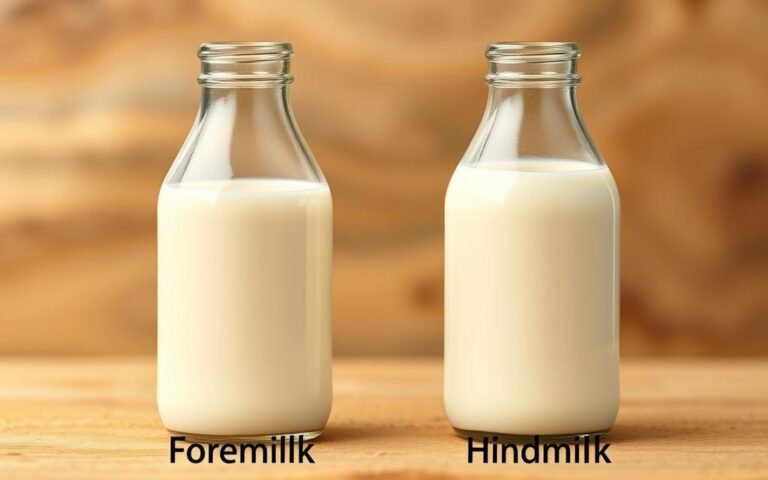Breastfed Baby Food Allergy Symptoms to Watch For

As a parent, worrying about your baby’s health is normal, even more so with food allergies. Babies fed by breast can get allergies from what their mothers eat. It’s key to spot these symptoms early to care for them well.
Breastfed babies face a higher risk of food allergies. Knowing the signs is vital for their health and your peace of mind.
Key Takeaways
- Exclusive breastfeeding or first infant formula is recommended for around the first 6 months of life to reduce the risk of food allergies.
- Common symptoms of food allergies in breastfed babies include mild to severe reactions, such as anaphylaxis, and can occur within a few minutes of exposure to an allergen.
- Cow’s milk allergies affect less than 0.5 percent of breastfeeding infants, but can be more common in formula-fed infants.
- Infants with asthma and/or eczema have a higher likelihood of developing a food allergy, making it essential for parents to be aware of the symptoms.
- Proper parenting and care can help manage food allergies in breastfed babies, and it’s essential to work with a healthcare provider to develop a plan.
- Breastfed infants should be supplemented with 400 IU of vitamin D daily if at least half of their feedings are breastmilk to ensure proper nutrition.
- Recognizing the symptoms of food allergies in breastfed babies is critical for their health and well-being.
Understanding Food Allergies in Breastfed Infants
Breast milk is the best food for babies, full of nutrients for growth. But, it can have allergens that cause reactions in some. Only 2 to 3 out of 100 exclusively breastfed babies show allergic reactions.
The most common allergen is cow’s milk. It can lead to severe colic, skin rashes, and trouble breathing. These symptoms are common in breastfed babies.
It’s important to know how allergens get into breast milk. Foods like cow’s milk, eggs, and nuts are common culprits. Understanding the difference between food allergies and intolerances is key. Allergies are immune system reactions, while intolerances are not.
Exclusive breastfeeding for the first six months lowers allergy risk. It also helps prevent eczema. Knowing how breast milk, allergens, and infant health connect is essential for healthy growth.
Signs of Food Allergies in Breastfed Babies
It’s important to know the symptoms of food allergies in breastfed babies early. Look out for skin rashes, eczema, and digestive problems like diarrhea or vomiting. The American Academy of Pediatrics (AAP) says 2% to 3% of babies have symptoms of food intolerance.
Some common food allergies in breastfed babies include milk protein allergy. Up to 3% of infants are allergic to cow milk protein (CMPA). It’s key to talk to a healthcare provider for a proper diagnosis and advice.
A study looked at 4,015 articles and 32 systematic reviews on introducing allergenic foods to kids’ diets. The AAP suggests introducing foods like peanuts, eggs, soy, and wheat at 6 months. This can help prevent more food allergies. Knowing these symptoms and taking action can ensure the best infant health for breastfed babies.
- Excessive crying
- Diarrhea (sometimes with blood)
- Spitting up
- Gassiness
- Bloating
- Stomachache
By recognizing these symptoms and getting medical help when needed, parents can ensure their breastfed babies get the care they need to grow well.
Skin-Related Symptoms and Reactions
For breastfed babies, skin symptoms can show if they have food allergies. Rashes, eczema, and hives are common signs. It’s important to know these symptoms and how they relate to food allergies.
Some breastfed babies get skin symptoms from allergens in breast milk. For example, if a mom eats dairy, the proteins can reach the baby. This can cause rashes or eczema. Hives are also common, often from an allergic reaction to a food.
Here are some key points to consider when it comes to skin-related symptoms in breastfed babies:
- Eczema is a common skin condition that can be triggered by food allergies, with approximately 10% of infants developing eczema by their first birthday.
- Rashes can be a sign of a food allergy, with common culprits including cow’s milk, eggs, and nuts.
- Hives can occur due to an allergic reaction, and it’s essential to monitor the baby’s symptoms and seek medical attention if they worsen or persist.
In conclusion, skin symptoms like rashes, eczema, and hives can mean food allergies in breastfed babies. Understanding these symptoms and their link to food allergies helps mothers manage their baby’s allergies. This ensures their child’s health and well-being.
Digestive Issues and Gastrointestinal Symptoms
As a breastfeeding mom, knowing about digestive issues in your baby is key. Gastrointestinal symptoms like diarrhea, vomiting, and stomach pain might point to food allergies. Studies show that up to 3% of babies have an allergy to cow milk protein (CMPA), with about 60% having the IgE-mediated form.
Watch for these gastrointestinal symptoms in breastfed babies:
- Diarrhea
- Vomiting
- Abdominal pain
- Bloody stools
- Green stools with mucus
If your baby shows any of these digestive issues, see your healthcare provider. They can check for a food allergy and guide you. Remember, breast milk is the best food for newborns and babies. With the right help, you can keep breastfeeding while solving any digestive issues.
Behavioral Changes That May Indicate Food Allergies
As a parent, knowing the behavioral changes that show food allergies in breastfed babies is key. These signs can mean your baby is reacting to something you eat. Look out for changes in sleep patterns, feeding difficulties, and fussiness.
Changes in sleep patterns can signal a food allergy. If your baby wakes up a lot or has trouble sleeping, it might mean they’re reacting to food. Also, feeding difficulties like refusing to eat or gagging could point to a food allergy.

General fussiness and discomfort can also hint at a food allergy. If your baby is often irritable or uncomfortable, it’s worth checking for a food allergy. Being alert to these behavioral changes and finding the cause can help your baby feel better and get the nutrients they need.
Some important things to watch for in breastfed babies include:
- Changes in sleep patterns
- Feeding difficulties
- General fussiness and discomfort
By keeping an eye on your baby’s behavior and recognizing these signs, you can start to figure out the cause. This is the first step to finding a solution.
When to Seek Medical Attention
As a parent of a breastfed baby, knowing when to seek medical help is key. Look out for emergency signs like trouble breathing, a fast heartbeat, or a drop in blood pressure. These could mean a serious allergic reaction, and quick action is vital for your baby’s health.
A healthcare provider can figure out what’s wrong and tell you the best treatment. When picking a healthcare provider, look for their experience with breastfed babies and food allergies. A good doctor can greatly help in managing your baby’s condition.
Some important signs that might mean your baby needs a doctor include:
- Vomiting or a lot of spit-up
- Diarrhea or bloody stools
- Difficulty breathing or breathing too fast
- Changes in skin color or temperature
If you’re worried about your baby’s symptoms or have health questions, contact your healthcare provider. They can give you advice and help decide what to do next to ensure your baby gets the care they need.
Documenting Symptoms and Keeping a Food Diary
Identifying food allergies in breastfed babies can be tough. But, by keeping a food diary, mothers can see how their diet impacts their baby’s health. It’s key to track symptoms to find patterns and links to food intake.
A food diary is a great tool for managing food allergies. It helps mothers track what they eat and how their baby reacts. This info is also useful for doctors to diagnose and treat food allergies.
Here are some tips for keeping a food diary:
- Track the foods eaten and when
- Write down any symptoms or reactions, including when and how bad they are
- Record any changes in the baby’s behavior or health
By following these steps and keeping a food diary, mothers can actively manage food allergies. This ensures their breastfed babies stay healthy.
Remember, tracking symptoms and keeping a food diary are vital for managing food allergies in breastfed babies. Working with healthcare providers and keeping accurate records helps babies thrive and avoid bad reactions to food allergens.
Common Foods to Eliminate While Breastfeeding
When a breastfed baby shows signs of a food allergy, the mother needs to try an elimination diet. This means removing common allergenic foods from her diet. Foods like cow’s milk, eggs, nuts, and soy are often the culprits.
Starting an elimination diet is a big step for breastfeeding moms. It’s also important to reintroduce foods slowly. This lets the mom see how the baby reacts. It might take weeks, and keeping a food diary is key to tracking changes.
- Milk and dairy products
- Eggs
- Nuts and tree nuts
- Soy
- Wheat
Remember, every baby is unique. What works for one might not work for another. With a healthcare provider’s help and a careful elimination diet and reintroduction process, moms can help their babies stay healthy and happy.
Working with Your Pediatrician on Diagnosis
Diagnosing food allergies in breastfed babies requires teamwork with a pediatrician. They help spot possible allergens and create a plan for diagnosis and treatment. They also guide on managing symptoms and avoiding future reactions.
Recent studies show up to 3% of infants are allergic to cow milk protein. About 60% of these have an IgE-mediated allergy.
A pediatrician will first look at the baby’s medical history and talk about symptoms with the parents. They might suggest keeping a food diary to track allergens. Sometimes, they recommend an elimination diet to see if symptoms lessen.
It’s key to work closely with a pediatrician to find the best way to diagnose and manage food allergies in breastfed babies.
- Skin prick tests or blood tests to check for allergic reactions
- Elimination diets to identify possible allergens
- Monitoring symptoms and adjusting the treatment plan as needed
By teaming up with a pediatrician, parents can get their breastfed babies the right diagnosis and treatment for food allergies. This teamwork can greatly improve the baby’s life and lower the chance of severe reactions.
Conclusion: Managing Food Allergies While Maintaining Breastfeeding
Managing food allergy management while breastfeeding your breastfed babies is a delicate task. But, with the right steps, you can keep your baby healthy and continue the benefits of breastmilk. Watch for allergy signs, work with your pediatrician, and make smart food choices. This helps avoid allergic reactions and keeps your baby well.
Every baby is different, and finding the right way to manage food allergies while breastfeeding takes time. Listen to your gut, keep a record of your observations, and ask for help when you need it. With commitment and care, you can guide your breastfed babies to a healthy and happy life.






